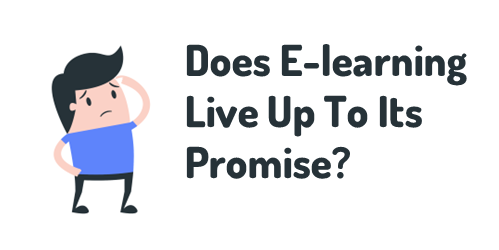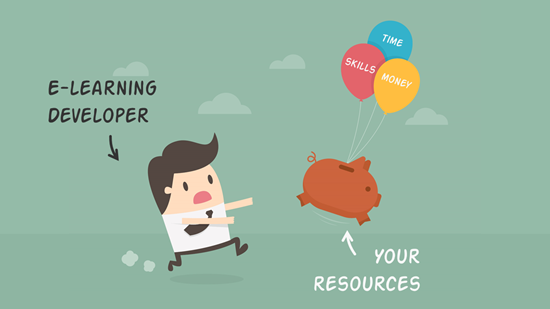
I’m putting together notes for an upcoming webinar on How to Develop a Successful Online Learning Strategy. I’m not one for industry hype and like to take a more pragmatic approach when offering tips because they tend to align with the reality of where organizations are compared to what they think they should be.
I’ve been thinking about the promise of e-learning and everything you read in books and online and hear at conferences from thought leaders about what effective e-learning should be.
E-Learning Thought Leader
There’s a disconnect between thought leaders and the reality of the e-learning industry. I think that disconnect happens because many of the thought leaders are also consultants and course vendors who get hired to build training.
Their perspective is different.
They are brought in by senior level management with business objectives that require some sort of training intervention. That manager typically has a healthy budget which can influence the development of the right type of training. Because they’re spending real money, they are also accountable to real results.

Because of this, the hired vendor has a commitment from the organization and the opportunity to do the level of analysis required to build and implement an effective training program. Plus, the majority of the courses they build tend to be performance-based courses tied to performance metrics.
E-Learning Course Builder
On the flip side, many of the people who build e-learning courses day-to-day aren’t afforded the same luxury.
From my experience, the internal e-learning teams often don’t have a seat at the table so they become order takers without access to the business intelligence (if that’s not an oxymoron) that determined the need for the course in the first place.
Which means they create a lot of content that’s not connected to measurable performance objectives. Thus many of the courses they create are informational or compliance courses not tied to applicable skills.

Also, there are a lot of single person-teams who have to do everything from content development to instructional design to graphic design to course authoring to publishing to LMS administration. And they do this with no significant budget. That’s a lot different than the vendor who gets the right types of resources to build effective e-learning.
In that world you can see how a vendor who has access to different resources and types of opportunities has a different perspective about e-learning effectiveness.
Build Better E-Learning
But how does any organization who doesn’t hire vendors build an effective e-learning program?
Here are some of the things I’ll cover in the webinar:
- Focus on both production efficiency and effectiveness as measures of success
- Understand the tools you use and develop a strategy around which ones to use and when
- Create a strategic content model to identify the type of course being built, the right objectives, and implementing the right performance support
- Upskill your e-learning developers so they are equipped to build the courses you need
- More
If you’re just getting started with e-learning or want to build a more effective online training program, join the webinar. If you can’t make it, that’s OK. Sign up and you’ll get a recording you can watch at your own time.
Events
Free E-Learning Resources
![]()




















